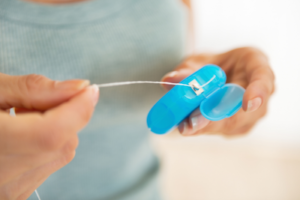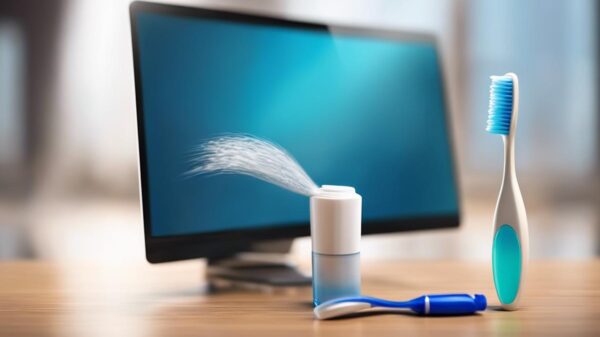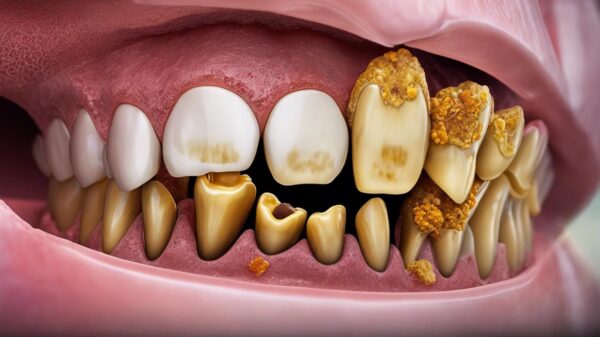Can I Reuse My Dental Floss?
We all know that flossing is an important part of any good oral hygiene routine. However, many individuals have questions about how to floss, when to floss, and why it is actually that important.
Is it okay to reuse dental floss? From a professional standpoint, a strand of dental floss should only be used one time. This means that each dental floss strand has the ability to be effective on time. Otherwise, a second or continual use of that strand can cause more harm. Reusing dental floss could cause many types of problems.
The biggest strike against it is for sanitary issues. If you think about it, that is like getting plaque and bacteria out from between your teeth, only to add it back in the next day. Bacteria can cause more problems than just bad breath and yellow teeth. You can get gum disease, cavities, plaque build-up, etc. This means that the purpose of flossing has basically been defeated. Flossing is an integral part of gum health, so it is important to make sure it is done properly.
Using a dental floss string one time is a good start to oral health. But, what about other tips and tricks to make sure you get the best oral hygiene results? Next, I have listed a few good tips to help keep your smile on track.
Why It Is Important To Floss Every Day?
It is important to floss every day because flossing removes plaque and food particles between the teeth which harden into tartar. If left untreated, it causes gingivitis, periodontitis, and tooth decay. It is important to floss effectively so you can remove the plaque, tartar, or bacteria on and in between your teeth. If flossing is part of your daily oral hygiene routine, it will not only improve your oral health but could also improve your overall health and appearance.
In addition, neglecting to floss every day can contribute to bad breath by keeping bacteria in your mouth longer than it should. If food is not removed from in between your teeth in a timely manner, it causes some major odor issues. No one likes the smell of days-old, unrefrigerated food. Flossing keeps your teeth healthy and your breath fresh.
Can You Floss Too Much?
The short answer to this is yes. You can actually damage your gums by flossing too much. Constant irritation and pressure on your gums can cause bleeding and inflammation. However, what is considered “too much flossing” can vary based on the types of food eaten, personal oral health, etc. A good rule of thumb that was mentioned previously in the article is to floss once every day. Flossing too much is not something to get hung up on, just be mindful that flossing too much can cause discomfort and irritation.
You also have to be careful about flossing too hard. If you are flossing too hard, it can cause harm to your teeth because of teeth clashing or gum irritation. It is important to try and be gentle with teeth cleaning to achieve the best results. You want to avoid teeth being slightly pushed out of alignment. If teeth do not line up, that could lead to a dentist recommending teeth braces. Braces are expensive and they can be uncomfortable as well, so it is better to simply floss and brush teeth gently.
Another side effect of flossing too rigorously is tooth decay or teeth sensitivity. Flossing too hard will make teeth weak even if you floss every day and take all other necessary steps for dental health.
Dental floss is generally pretty sturdy, so you can pull on it a lot and not damage it, but it can still tear or fray if pulled too hard. This will no longer remove the plaque between teeth and, in fact, will only move the plaque around. If you want to continue having healthy teeth and gums, you will have to learn how much force is appropriate when flossing.
How To Floss Correctly
It is important that when you floss, you floss correctly. The dental experts at Hopper Dental shared some tips with us on how to floss effectively with the best results. First of all, the floss that you use must be thin, pliable, and smooth so it can easily slip between the tight flossing spaces.
Floss at a 45-degree angle to the gum line, be sure to place the floss between your thumb and index finger. Using an up-and-down motion, guide floss between each pair of adjacent teeth. Wrap the floss around the base of your thumb and floss up into the space between two teeth, then floss down with floss behind floss. Flossing takes practice, just like anything else in life. It becomes easier every time you floss.
*Tip- use a floss threader if you have difficulty seeing the spaces between your teeth, and tongue flossing is a great option as well.
Can Flossing Affect My Overall Health?
 Yes, flossing effectively every day can help prevent sometimes serious health issues that are caused by plaque and bacteria build up in your mouth. You need to floss every day because if you do it only once a week, there will be a lot of plaque build up between teeth and that can over time, cause your teeth to fall out. If you don’t floss, your teeth may become infected with bacteria, which can lead to other teeth illnesses like cavities.
Yes, flossing effectively every day can help prevent sometimes serious health issues that are caused by plaque and bacteria build up in your mouth. You need to floss every day because if you do it only once a week, there will be a lot of plaque build up between teeth and that can over time, cause your teeth to fall out. If you don’t floss, your teeth may become infected with bacteria, which can lead to other teeth illnesses like cavities.
Flossing daily as part of your teeth maintenance regimen will help remove plaque from teeth that brushing your teeth cannot reach a. A person who flosses every day has statistically fewer teeth they have lost in their lifetime than a person that does not floss daily. While flossing is important for teeth health, brushing your teeth twice a day, preventing your teeth from grinding, and having regular check-ups with your dentist are equally important to teeth maintenance.
Proper flossing is the cornerstone of oral health care. Improper flossing leads to bad breath, bacteria buildup between teeth which eventually results in cavities, and more serious diseases such as heart attacks or strokes. That is why flossing your teeth can save your life. Yet, about half of Americans do not floss their teeth regularly. That means that half of Americans are at risk for serious health consequences.
Is Flossing Cost-Effective?
A recent survey of 200 Americans from all over the nation determined that most people are not flossing their teeth often enough, each day. This is surprising because flossing teeth can save lives and money. It only costs $0.50 for a 10-foot box of dental floss, but the cost to get a single cavity filled is around 200-300 dollars a tooth. That is just for cavities, there are more serious expenses you could have to afford.
In the long run, flossing will help keep teeth from decaying, needing root canals, or expensive dental implants. This includes false teeth, bridges, and oral surgery. Many of these procedures can cost thousands of dollars. It is safe to say that flossing is a way to save money, time, and a toothache.
You can easily prevent teeth problems and cavities by flossing teeth every day. That is why it is important to learn how to floss teeth correctly! Flossing teeth properly can increase life expectancy and improve your overall health. Not to mention, the health of your wallet.
It is safe to say that flossing every day, and flossing correctly has many benefits to our lives. Not having to go to the dentist all the time for hours on end is a major life improvement. In addition, our health and our wallets will thank us later for taking the time to floss every day and floss properly. Many times we neglect the small tedious tasks, but those are often the ones that can make the biggest impact on our life. So remember, throw out that old dental floss and begin a new oral hygiene journey. Fresh dental floss equals a fresh mouth and a fresh start!












